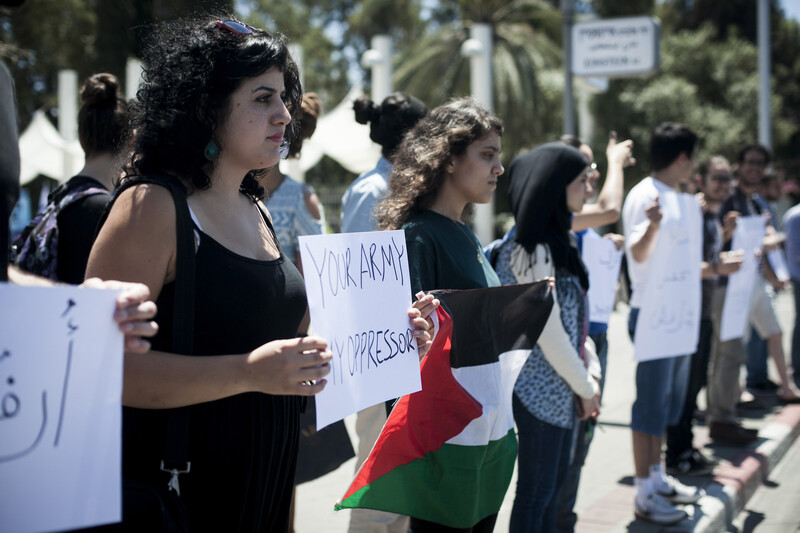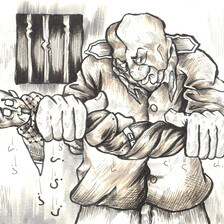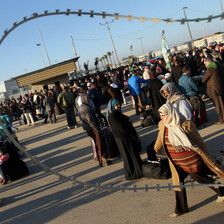The Electronic Intifada Haifa 13 October 2014

A photo published by the Israeli prime minister’s office on Flickr shows Jibril Nadaf with Benjamin Netanyahu in August 2013.
Yara Salameh was shocked when she watched Jibril Nadaf, a priest from Nazareth, repeat a call on fellow Palestinian Christians to serve in the Israeli military.
Nadaf claimed Israel was the only country in the Middle East where Christians are “not persecuted” during a speech to the United Nations Human Rights Council on 23 September.
“I couldn’t believe it,” said Salameh, a 25-year-old pharmacist from the village of Turan, home to both Christians and Muslims, located in the Galilee region of present-day Israel.
“He represents no one but himself. The army he wants us to join is the same one shedding the blood of our innocent brothers and sisters — Palestinian blood just like ours,” she told The Electronic Intifada.
Nadaf is active at the local Greek Orthodox Church in Yafa al-Naseriyye, a Palestinian village near his native Nazareth. In October 2012, he joined the Forum for Drafting the Christian Community, an organization that promotes military conscription for Palestinian Christians in Israel.
Though military service is not mandatory for Palestinian Christians, Israel has in recent years promoted voluntary conscription among them.
“This is just another evil plot to make us view our struggle from a religious point of view, and it is rubbish,” added Salameh, whose grandparents were forced out of the almost entirely Christian village of Iqrit in the Galilee region during the Nakba, the 1948 ethnic cleansing of Palestine by Zionist forces.
Signing a death warrant?
And despite Nadaf having become widely known and extremely vocal, most other Palestinian citizens of Israel have roundly rejected his calls to serve in Israel’s military, which for decades has occupied Palestinian, Syrian and Lebanese lands in violation of international law.
An estimated 1.7 million Palestinians carry Israeli citizenship and live in cities, towns and villages across the country. Together they constitute a diverse community of people from Muslim, Christian and Druze religious backgrounds, and hold a wide array of political affiliations.
According to the Haifa-based legal center Adalah, more than fifty Israeli laws restrict the political expression of and limit access to state resources for all Palestinian citizens of Israel, regardless of religious background or political affiliation.
Nadaf, however, made no mention in his speech at the United Nations of the dozens of anti-Palestinian laws or the widespread discrimination Palestinians in Israel face in every aspect of life.
Those who campaign against Israel, he said, “are signing the death warrant on the last free Christians in the Holy Land.”
Palestinian activists and political leaders in present-day Israel condemned Nadaf’s speech.
According to the rightwing news site The Times of Israel, Nadaf was brought to Geneva to deliver the speech by The Face of Israel, a group affiliated with the Israeli government.
“Working to divide”
Basel Ghattas is a member of the Israeli parliament, the Knesset, with Balad, a political party representing Palestinians in Israel. He is a vocal opponent of the ongoing efforts to conscript Palestinian Christians into the military.
Nadaf went to the United Nations to speak “with the Israeli administration, and that reveals what his true goals are,” Ghattas told The Electronic Intifada. “He serves the rightwing Israeli establishment by working to divide Christians and Muslims. It’s about marketing Israel’s policies.”
The widespread resistance to Nadaf’s program and Israeli efforts to increase military conscription haven’t stopped Benjamin Netanyahu’s government from further attempting to divide the Palestinian minority along sectarian lines.
In September, Gideon Saar, the Israeli interior minister known for his anti-Palestinian views, ordered the country’s population registry to allow Christians to register as “Aramean” rather than “Arab” on official identification documents (supposedly a reference to ancient Aramaic-speaking peoples in the region).
“It’s ridiculous,” Ghattas added. “They are trying to use the spread of extremist Islamist groups in Syria, Iraq and even Lebanon to claim Israel protects Christians. But Palestinian Christians are persecuted by the Israeli occupation.”
He added that “the majority of Christians [in present-day Israel] are against this plan, and we’re confident that [conscription] won’t be victorious.”
“Racist goals”
In July 2013, The Times of Israel reported that a group of Palestinian Christians associated with Nadaf in Nazareth and elsewhere were planning to establish Sons of the New Testament, a new political party that supports Christian enlistment in Israel’s occupation army.
“This is really crazy and dangerous,” Waad Ghantous, a 23-year-old activist whose grandfather was expelled from the Galilee village of Kufr Birim in 1948, told The Electronic Intifada. “As Palestinians living in the occupied ’48 territories [present-day Israel], we shouldn’t help Israel succeed in its colonial [and] racist goals by volunteering to divide ourselves even more.”
“Christian, Muslim, Druze, Aramean – it doesn’t matter,” she said. “The West Bank, Gaza, Jerusalem or Haifa — it still doesn’t matter. We are all Palestinians, and it is occupation no matter where we live or what our political and religious backgrounds are.”
Back in February, Israeli politician Yariv Levin proposed a law that would create separate representation for Christians and the rest of the Palestinian community in Israel on a national employment committee.

Students at Tel Aviv University protest a government plan to enlist Palestinian Christians in the Israeli army, April 2014.
ActiveStillsThough it remains unclear how much support these efforts enjoy, a clear majority of Palestinians in Israel have campaigned continuously against both enlistment and the top-down efforts to divide them.
Eighteen Palestinian groups in Israel subsequently issued a joint statement denouncing the draft law as “colonial” and “sectarian.”
The statement decries the legislation for the parallels it shares with “approaches adopted by the apartheid regime in South Africa, and by France in its colonial rule in Algeria, among others.”
“It is a policy that seeks to fragment the original people of the land into small groups with narrowed identities to replace their national identity,” the statement adds.
Israel’s designs for Christians come as a growing number of conscientious objectors are emerging among Palestinian Druze, a religious minority that has been required to serve in Israel’s military since a minority of Druze religious leaders signed an agreement with the government in 1956.
“Sectarian warfare”
“The movement against conscription is growing very fast, and people know about the dangers of serving in the military much more than before,” said Fady Asleh, a founding member of Refuse, one of the leading groups campaigning against mandatory military service for Palestinian Druze.
“But at the same time, the Zionist groups and Israeli institutions are working on their project to conscript us more than before, as well. We have a lack of institutions to represent Palestinians [in present-day Israel],” he said. “Israeli institutions have threatened to condition our rights on our ‘loyalty’ to the state. That is neither moral nor legal.”
“Israel is well aware that this has nothing to do with religion,” Asleh added. “It’s about sectarian warfare being imposed on Arabs here by an occupier. Israel dreams of bringing up a new generation that thinks about its religious sect before its Palestinian national identity.”
Baladna, a Haifa-based Palestinian advocacy group and signatory of the statement, has also been at the forefront of campaigning against military conscription.
“It’s important that we all understand that Nadaf is basically an Israeli tool,” Nadim Nashif, director of Baladna, told The Electronic Intifada. “He goes to the UN the US, and Europe on trips funded by Israel and Zionist groups.”
Though Nashif believes Israel’s conscription project is doomed to failure, he said “it is very important to continue resisting” Israel’s attempts to conscript Palestinians of any background into the military.
“The main risk we face by inaction is that [military service] will one day be mandatory,” he warned.
Patrick O. Strickland is an independent journalist and frequent contributor to The Electronic Intifada. His reportage can be found at www.postrickland.com. Follow him on Twitter: @P_Strickland_.





